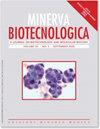Predicted peptide-based MHC-I, MHC-II, CTL and B-cell epitopes of MUC-1 by immunoinformatics methods: a clue for novel multi-epitope vaccine development against breast cancer
IF 0.9
Q3 Biochemistry, Genetics and Molecular Biology
引用次数: 0
Abstract
BACKGROUND: Breast cancer (BC) is one of the most common types of women malignancy. Multi-epitope vaccines are new hopes for treatment of this cancer. MUC-1 is a tumor associated antigen that focused for multi-epitope vaccine development in case of BC. METHODS: Here, primary data from a computation analysis of this glycoprotein to find potential MHC-I, MHC-II, CTL and B-cell epitopes are described using immunoinformatics tools. RESULTS: According to the results, 1156VPGWGIALL984 corresponding to HLA-B0702 and HLA-A0101 alleles for MHC-I epitopes, 1209YPTYHTHGR1118 corresponding to DRB1*13 and DQB1*06 alleles for MHC-II epitops, 1122NQYKTEAAS45 for CTL epitopes and 1204HPMSEYPTYHTHGRYV896 for B-cell epitopes are the peptides with the best binding affinity. CONCLUSIONS: These data may be useful for further multi-epitope vaccine development. KEY WORDS: Breast neoplasms; Epitopes; Vaccines, synthetic; Mucin-1利用免疫信息学方法预测MUC-1的MHC-I、MHC-II、CTL和b细胞表位:为开发新型乳腺癌多表位疫苗提供线索
背景:乳腺癌(BC)是最常见的女性恶性肿瘤之一。多表位疫苗是治疗这种癌症的新希望。muc1是一种肿瘤相关抗原,主要用于BC病例的多表位疫苗开发。方法:本文使用免疫信息学工具对该糖蛋白进行计算分析,以发现潜在的MHC-I、MHC-II、CTL和b细胞表位的主要数据进行了描述。结果:MHC-I表位对应HLA-B0702和HLA-A0101等位基因的1156VPGWGIALL984、MHC-II表位对应DRB1*13和DQB1*06等位基因的1209YPTYHTHGR1118、CTL表位对应的1122NQYKTEAAS45和b细胞表位对应的1204HPMSEYPTYHTHGRYV896是结合亲和力最好的肽。结论:这些数据可能有助于进一步开发多表位疫苗。关键词:乳腺肿瘤;抗原表位;疫苗、合成;Mucin-1
本文章由计算机程序翻译,如有差异,请以英文原文为准。
求助全文
约1分钟内获得全文
求助全文
来源期刊

Minerva Biotecnologica
生物-生物工程与应用微生物
CiteScore
2.00
自引率
0.00%
发文量
0
审稿时长
>12 weeks
期刊介绍:
Minerva Biotecnologica publishes scientific papers on biotechnology and molecular biology. Manuscripts may be submitted in the form of editorials, original articles, review articles, special articles and letters to the Editor. The journal aims to provide its readers with papers of the highest quality and impact through a process of careful peer review and editorial work.
 求助内容:
求助内容: 应助结果提醒方式:
应助结果提醒方式:


